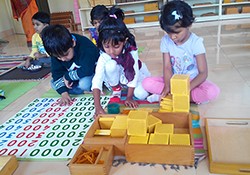Are you a happy Montessori teacher like me?
Are you a happy Montessori teacher like me?

Ms. Jennifer Collins is a certified Montessori teacher. She has been working in the Canadian International School for the last 15 years. She has a lot of experience in early education and enjoys working with the tiny tots.
In this candid interview, Ms. Collins shares her experiences as a Montessori teacher and Montessori education in general.
1. You have an experience of 15 years in teaching tiny tots. What or who inspired you to take up this profession? Why early education?
The inspiration to teach or my dream of teaching grew up with me since my childhood. Although I chose a different profession after my college, I instantly knew that it was not what I wanted to do. I got lucky as a teaching opportunity in a Montessori school opened the doorway to my dream.
2. What do you like the most about working with children?
Working with children is my desire or passion, which comes from within. Children become your main inspiration.
I really enjoy the creativity and inquisitive minds of young learners.
There are many occasions where I learn things from them and they help me open my mind.
3. What has so far been your most rewarding experience?
Since I teach early years, every moment is rewarding. The main aim of Montessori learning is gaining independence and confidence. I feel rewarded every time a child exclaims with pride, ‘I did it on my own’ or ‘I can do it myself’.
 4. What are some of the problems that Montessori teachers face?
4. What are some of the problems that Montessori teachers face?1. Investment to start up a school since all the Montessori materials are expensive.
2. You need a spacious area for a classroom. So, finding a right place which is big enough is always a challenge.
3. The transition from a Montessori school to a regular/traditional school can be a challenge for some children.
5. Children of this age group usually have short attention span and are easily distracted. How do you keep them engaged and attentive in the class?
As an early years teacher, one always needs a well-planned lesson. We always have an interactive presentation of not more than 5-7 minutes, depending on the age group. Since Montessori is a purely hands-on learning method, the children are always engaged in activities. Whenever we need to get their attention as a group, we have few strategies the we use such as:
-
Give me five (Eyes on the speaker, Be quiet, Be still, Hands free and Listen)
-
Following the rhythm of clapping hands (The teacher claps once the students will follow the same rhythm and so on)
-
Ringing a bell, etc.
6. How can behavioural issues in children be addressed in the classroom?
-
I strongly believe that at any age group, it is very important for every classroom to have a routine which is followed by the children every day. At the same time, as teachers, we should have clear and simple expectations for the classroom which are clear to the students.
-
Every teacher or every classroom has different ways of addressing the behavioural issues. It also depends on the child’s age and the behavioural issue. We always try to know the reason for the behavioural issue. For the early years, ‘thinking chair’ works well. Sometimes, if the behaviour hurts someone or disturbs others, teachers should try to talk to the child and find out the problem. Based on the reason the child gives, a choice to use a thinking chair is given. For early years it always works if we ask the child ‘how do you feel if someone hurts your feelings?’ or ‘how do you feel if someone hurts you physically?’
-
We also encourage children to speak up for themselves and use words like ‘please stop I don't like it’. This helps them handle certain situations on their own.
7. What is the role of a parent in the tiny tot’s activities in school? Please elaborate.
-
In early years, the parents play an active role in the child’s activities. We have an ‘open door’ policy where parents can come and observe their child at work with prior appointment.
-
We also organise child-parent day where the parents plan and participate in the theme-based activities. During sports day, parents come and watch their kids and participate in games.
-
Our school is very diverse with many cultures from different countries. During the multicultural week or festival of arts week, we have parents coming from different countries and sharing their culture of food, art and craft with the students.
-
Parents are encouraged to share their professions with students on the day of the theme, ‘community helpers’.
-
We have potluck lunches during winter and year-end events, where parents bring a dish each, and share it with the whole ‘early years’ community.
8. How can creativity be developed at a young age?
All children are creative by nature. Each child’s mind works differently. Respecting and encouraging the individuality brings out the best creativity in children. An open learning environment is always best for their creativity.
At our school, Montessori learning method is practiced where children are free to use the material of their choice and get creative. They can use each material in many creative ways. Group discussions and peer learning are also some of the key points to bring out the best creative side of a child.
9. What according to you are values that need to be taught at a kindergarten level and why? Kindly elaborate
The school is a caring community of learners in which there is a palpable bond connecting the students, the staff, and the school.
Values need to be taught at a very early age, even before children start schooling. This learning should start at home. As teachers, we need to mould every value or principle what is taught to the kids.
At an early age, social-emotional development, respect, honesty, caring and collaboration are most important values that need to be taught.
10. Child safety is a growing concern in schools. How can kids be informed/taught about keeping themselves safe in a manner in which they understand?
Child safeguarding is one of the units in the Montessori curriculum. This curriculum not only has child safety, but also consists of personal hygiene, learning about their bodies, etc.
Children are made aware even at the early age, about strangers, bad touch and good touch, and these concepts are introduced to them through stories, role play and puppet shows.
11. What is your message for Montessori teachers of the country?
Montessori learning method is one of the special teaching methods where one can help children gain their confidence, independence, problem solving skills and most of all, love of learning. As teachers we should treat every child as an individual and respect their abilities. We need to keep an open mind to nourish and encourage their creative minds.





















